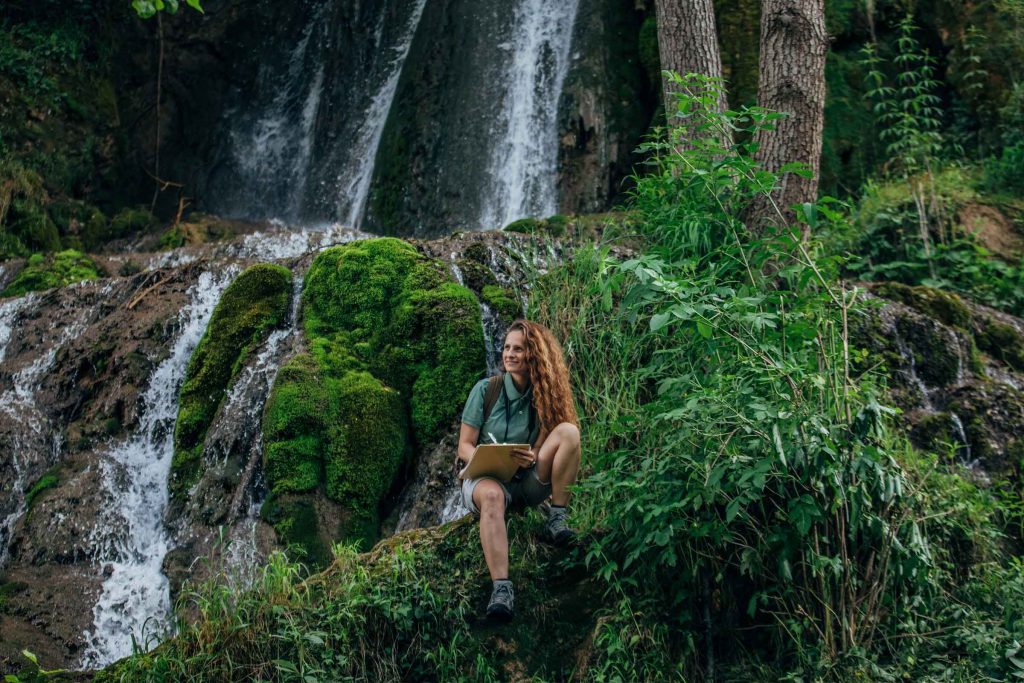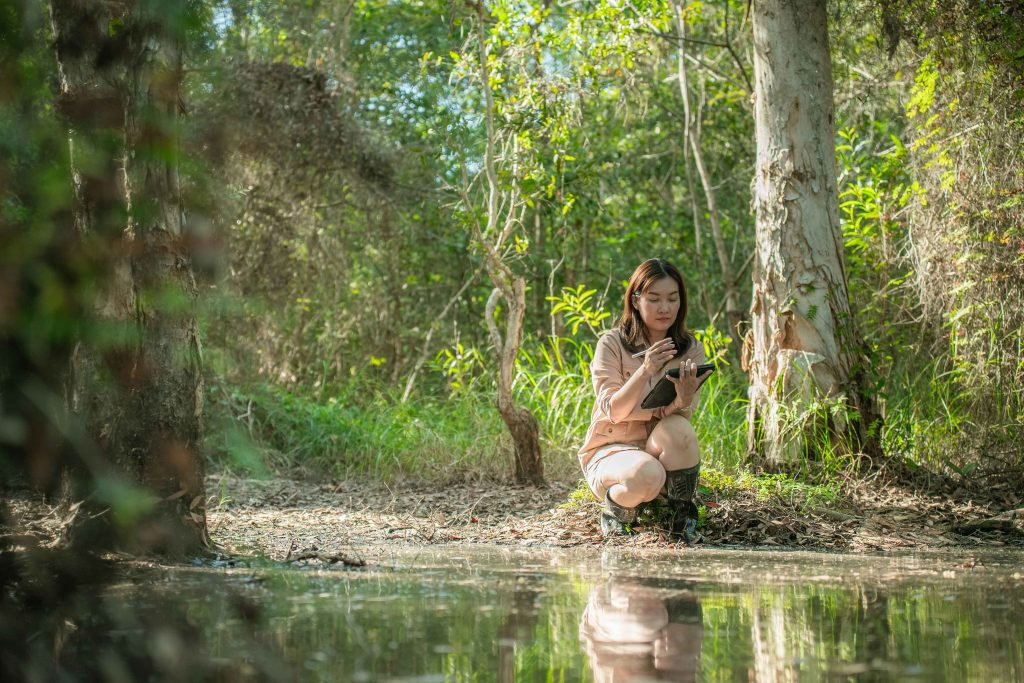Can you hear it? The call for sustainability and environmental stewardship is getting louder and louder. We can’t ignore it. We need change, and one of the many avenues toward a greener future, is the growth of green jobs. These roles not only serve the planet but also offer you a profound opportunity to merge your passion with your profession. To make a tangible difference while securing your future. So, let’s take a look at them. What are green jobs and how do you put yourself in the best position to get one?
What are green jobs?

Green jobs are all about working in ways that help the environment and make the world a better place. These jobs come in lots of different shapes and sizes. Think protecting nature, farming sustainably, circular economies and combating climate change.
But you can also find them in pretty much any industry, as businesses look to transition to more sustainable ways of doing things. So besides what we might think of as ‘traditional’ green jobs – like conservation biologist or water resources manager – there is now a wide spectrum of opportunities in many different sectors. In everything from transport and fashion to engineering and tech – industries are looking for professionals with environmental skills and knowledge to help them become more sustainable.
People in green jobs care a lot about making sure their work doesn’t harm the environment and helps keep the Earth healthy for the future. They’re like guardians of the planet, making sure we leave behind a world that’s even better for the next generation.
Here’s how Jonathon Howard, a Charles Sturt academic who teaches environmental science and researches sustainability, puts it:
We have to balance the needs of the environment, humanity and the economy. It’s also about balancing the needs of current and future generations. If we don’t get the balance right there is no future.”
The benefits of green jobs
Getting into green jobs isn’t just about helping the planet; there are lots of other reasons why it makes sense.
Environmental benefits: This is, of course, a big one. Green jobs do incredibly important things, like mitigate against climate change, preserve biodiversity and safeguard natural resources. Secure a green career and you’ll contribute to the health and resilience of our planet.
Economic benefits: While it sometimes seems like the world’s politicians haven’t got the memo yet, green jobs also stimulate economic growth and innovation. They create new avenues for employment, drive investment in sustainable technologies, and also foster the emergence of green industries. It’s the green transition we need for a sustainable and prosperous future.
Social benefits: Green jobs aren’t just about environmental impact; they also nurture social equity and community wellbeing. By prioritising public health, improving living standards and promoting social cohesion, they empower individuals and communities to thrive in harmony with nature.
Personal benefits: So, let’s talk about you. Pursuing a career in green industries offers profound personal fulfilment. It’s true. You can actually work in a job that aligns with your values. Gives you a sense of purpose. And also makes a meaningful contribution to your community, country and the world. Now, that’s a powerful combination.
6 traditional green career jobs to consider

Here are a few ideas for green careers. Are they important? Darn straight they are. Essential, even. And rewarding.
- Environmental engineer: As an environmental engineer you’ll design and implement solutions to address challenges such as pollution control, wastewater treatment and sustainable resource management.
- Green building designer: Specialise in creating environmentally sustainable buildings and structures that minimise energy consumption, reduce waste and incorporate renewable materials and technologies.
- Sustainability specialist: In this green career, you’ll work across various industries to develop and implement sustainability initiatives, conduct environmental assessments, and also promote eco-friendly practices and policies.
- Environmental scientist: You’ll study the natural environment and analyse data to assess the impact of human activities on ecosystems, wildlife habitats, and air and water quality. Then, devise solutions to protect them.
- Energy efficiency consultant: In this role, you’ll help businesses and organisations identify opportunities to reduce energy consumption, lower costs and minimise environmental impact through improved energy management practices.
- Sustainable agriculture specialist: Sustainable agriculture specialists promote environmentally friendly farming practices that conserve soil, water and biodiversity while enhancing food security, resilience, and the livelihoods of farmers and rural communities.
The greening of the economy
There are also emerging roles that are not what you might think of as ‘traditional’ green jobs. These are career paths that are more focused on embedding sustainable practices into existing industries. It’s often referred to as the ‘greening of the economy’ and these jobs are sometimes called ESG (environmental, social and governance) roles.
For corporations, sustainability is simply good business. They are looking for people who can think about the circular economy so they lower the costs of doing business, reduce their waste and lessen their impact on the planet.
These types of green careers are becoming increasingly important – and qualified people to fill them more in demand – as companies recognise the need to address sustainability, social responsibility and ethical governance practices in their operations.
How to get a green job
The first thing you want to do is gain the knowledge and skills you need to make a real difference. And the best way to go about it? Get a degree. Charles Sturt’s Bachelor of Environmental Science and Management sets you up for success – wherever you want to take your career. You can study online, and you’ll get lots of practical green jobs training on professional work placements.
Moreover, the knowledge you’ll gain about everything from environmental data analysis and GIS systems to stakeholder engagement and First Nations foundations can be applied to any type of green job, in almost any industry.
Plus, we’re in the top 11 per cent of unis worldwide for climate action. Meaning, we make sure sustainability is at the heart of everything we do – from energy on our campuses, to what you learn on your course.
In addition to your studies, gaining practical experience through internships and volunteer work will enhance your credentials no end. Moreover, you’ll start building a network in green industries.
Essential skills for green jobs

Besides environmental literacy and a passion for sustainability, you’ll need certain soft skills to help you excel – whichever type of green job you want to go into, whether traditional green careers or in the emerging ESG sector.
Problem-solving and critical thinking: The green future needs new ideas. Novel ways of doing things. Ways that put sustainability first. The ability to analyse data, evaluate alternative strategies, and think critically will mean you can identify root causes, anticipate potential consequences, and also develop the very best interventions that balance environmental, social and economic considerations.
Collaboration: Green industries thrive on both collaboration and interdisciplinary approaches. Getting diverse perspectives and expertise together is only going to help innovation. So effective communication and teamwork are key skills to develop that will guide collective action toward shared goals.
Adaptability and resilience: The transition to a greener economy is probably going to be a bit volatile. As a result, adaptability and resilience are invaluable attributes for green pros like you. The capacity to embrace change. Learn from setbacks. And pivot in response to evolving circumstances will enable you to thrive even when things get tricky.
Social responsibility: Green professionals play a pivotal role in promoting ethical conduct, social responsibility and environmental justice – both within their organisations and their communities.
[Did you know? You could get an offer to study our Bachelor of Environmental Science and Management based on your soft skills? That’s right; you could even get an offer before you sit your final exams. Check out the Charles Sturt Advantage for more info.]
Be the change
Explore our Bachelor of Environmental Science and Management. It’ll prepare you to take up the good fight in a green career. Or chat to our team about your next step.


You must be logged in to post a comment.